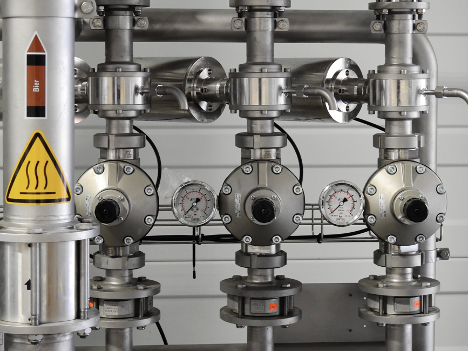
In this industry, it is essential that you fully understand how to install an HVAC or air-compressor system. You must familiarize yourself with these systems and what they do.
What is an HVAC System?
An HVAC system is a heating and cooling system that regulates high-velocity airflow via small ducts throughout the building. HVAC systems can fit into any building infrastructure, and factor in the architectural limitations, space constraints, and requirements for heating and cooling. An HVAC system consists of an air-chiller unit, a boiler unit, high-pressure fans to push the cold or warm air through the pipes, and the ducts in each area that need cooling or heating.
What is an Air Compressor Distribution System?
It is a system that ensures air delivery for a required application. There are two types of air compressor systems, and there are various factors to consider before you can choose between the two of them. You must learn how to decide which one is right for your requirements.
Centralized Air Compressors
This system consists of a central compressed air system, where large dryers and air compressors located in one assigned area provide compressed air to the entire facility. This type of installation uses extensive ductwork and pipes to distribute the air to every area, section, and department of the building that needs air circulation.
The advantages of centralized air compressor systems include:
Low Cost
Typically, a centralized air compressor system requires less installation equipment. Also, the cost of distribution pipe installation is far less than what it would cost to install small air compressors throughout the building.
Easy Logistics
You will install the air compressor system in one specific area, which means you will only need to address a single area for noise reduction.
Easy Monitoring
As the whole system operates from one centralized location, you can monitor it from that location instead of running around various stations throughout the facility.
A Decentralized Air Compressor System
These systems operate by installing several smaller dryers and air compressors throughout the building in areas that require air circulation. A decentralized air compressor system requires less extensive piping because units in each location compress and generate their own air.
Some of the pros of using these systems are:
Customizable Type of Air
Decentralized air compressor systems can deliver the customized type of air required by each area of the building. For example, if you require oil-free air in only one spot, you can quickly achieve that goal via this air compressor.
Lower Risk of Pressure Drop
Pressure drop may be a frequent occurrence during peak hours in a centralized air compressor system. However, the decentralized system effectively eliminates pressure drops.
Lower Risk of Leakage
The distribution channels of these systems are shorter and more localized. Therefore, it is easier to identify and repair leaks.
Undetectable leaks are one of the primary causes of energy waste in both HVAC and air compressor systems.
Ten Tips for Planning HVAC and Air Compressors Installation Projects
Although there are numerous factors that you must consider during installation planning for an HVAC or air compressor system, here are the top ten tips to help you in your future endeavors.
Calculate the Load
The first step is to calculate the load requirement of your project. You must calculate each room or area’s specific load requirement for your air compressor or HVAC system.
The wrong calculation, or missing out on any details, may end up costing you money and will eventually leave you with an HVAC system that might be underwhelming in performance. Either way, it will end up costing you a lot more in power consumption.
If you are not sure about the calculations, then you can always get help from the experts at Tate.
Lower Costs
As a project manager, it’s your job to offer cost-effective solutions. Therefore, a centralized HVAC and air compressor system will be a more economical solution. It requires less equipment, and the piping costs are cheaper than installing multiple small units throughout the building.
Easier Logistics and Monitoring
Try to choose a single area for installing the central HVAC system, so it is easier for you to manage and monitor the entire system from a single platform. It will also help you with noise reduction throughout the building by keeping all of your equipment in one place.
Customizable Solution
Whichever system you use, you must consider all scenarios and requirements of your facility during installation planning. An HVAC or air compressor system with customizable air type and airflow will come in very handy. That way, you can supply air quality and appropriate temperatures to each area, according to the specific requirements.
Rectifying Pressure Drops
If you are using a centralized system, chances are you may experience extensive pressure drops during peak hours of operation. Therefore, you must get expert advice if you choose a decentralized system to address the pressure drop issue.
Overall Costs
A centralized HVAC system or air compressor system will not only be a low-cost option for installation, but also a low-cost option in the long run, even with maintenance and repairs.
Factor in the Maintenance Requirements
If you have a huge facility or building, then you may want to consider a decentralized system. It’s sometimes more convenient to maintain as it requires less piping. However, it will be a lot more time consuming, as you will have to do lengthy inspections, repairs, and maintenance for a large number of compressors at various locations.
Do Not Install Used Units
While choosing used or refurbished units comes with lucrative discounts, they end up creating more problems and will cost you more in the long run. Plus, they can put you, your colleagues, and occupants of the facility at risk.
Check the Power Capability
Whichever solution you choose, always make sure that your building has enough energy to power your HVAC and air compressor systems. Insufficient or inconsistent power supply will not only cause an interruption in service, but will damage your equipment as well.
Consult Reputable Installation Experts
You must always make sure to get the best service to get it right on the first go. Come to Tate Engineering for your consultation and installation planning. We have experts ready to help you immediately.
Tate Engineering is a dedicated expert when it comes to HVAC installation and air compressor system solutions. The team will not only sit down with you to discuss your needs, but will also work with you from beginning to end. They will keep you a top priority and will advise you on the best solution for your building and your budget.

